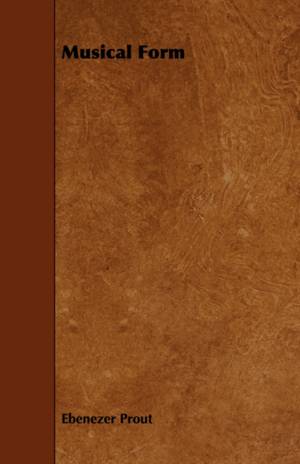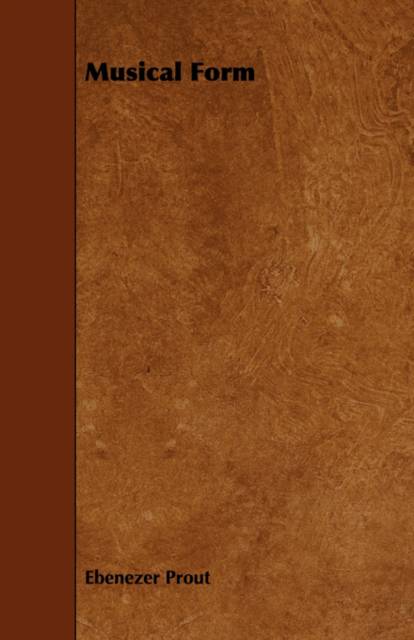
Bedankt voor het vertrouwen het afgelopen jaar! Om jou te bedanken bieden we GRATIS verzending (in België) aan op alles gedurende de hele maand januari.
- Afhalen na 1 uur in een winkel met voorraad
- In januari gratis thuislevering in België
- Ruim aanbod met 7 miljoen producten
Bedankt voor het vertrouwen het afgelopen jaar! Om jou te bedanken bieden we GRATIS verzending (in België) aan op alles gedurende de hele maand januari.
- Afhalen na 1 uur in een winkel met voorraad
- In januari gratis thuislevering in België
- Ruim aanbod met 7 miljoen producten
Zoeken
Omschrijving
PREFACE preceding volumes of this series have dealt chiefly with matters of musical theory, though theory and practice are so closely connected that it is impossible to draw a hard and fast line of demarcation between them. The present volume, on the other hand, is almost entirely practical, and points of theory are hardly touched upon. None of the earlier works of the series have involved anything like the amount of labour in their preparation that has been useful for this one. Very little is to be found in English musical literature concerning the subjects which occupy the greater part of the volume and the materials had to be compiled partly from large German treatises on composition, which, however interesting and instructive, can certainly not be considered as light reading, and, to a still larger extent, from the careful and often minute analysis of the works of the great masters. This, it is hoped, will be deemed a sufficient apology for the deIay in the appearance of the present volume. In dealing with the subject of Musical Form, the author felt that the only satisfactory and logical method was to begin with the rudiments. Rhythm-that is, the more or less regular recurrence of cadence, is as much an essential of music as it is of poetry. The first part of this volume is therefore devoted to an examination of the fundamental principles of Rhythm, as shown in the construction of musical phrases and sentences. Such an examination would have been incomplete without the analysis of a musical sentence into its ultimate constituents-the thoughts In his treatment of this part of the subject the auther must express his deep indettedness to the researches of Mr. Hugo Riemann. He believes that this distinguished Germas theorist has been the first to recognize fully the true nature of the motive, and the connection of its unaccented notes, not with the preceding, but with the following accented note. Vith this view which is fully explained in the third chapter of the present volume, the author must emphatically agrees and its comprehension and acknowledgment make clear many things in the works of the great composers which otherwise appear incorrect, or at least difficult of justification see, for instance, the passages quoted in 5 64, 65. While differing in many details from Dr. Riemann as to its application, the author believes the principle itself to be of such importance that it is hardly too much to say that the whole teaching of this volume stands or falls by the acceptance or rejection of the views here set forth as to the nature of the motive. To the analytical method followed up to this point succeeds the synthetical. Having divided sentences into motives, the next thing is to build up motives into sentences. But, inas much as many sentences contain modulations, it was first necessary to go fully into the whole question of key-relationship and modulation. These matters had been partially treated in Chapter IX. of Harmony which, however, dealt only with nearly related keys, and, incidentally in later chapters of the same book. The author felt that a more systematic and thorough investigation of the subject was desirable here and three chapters of this volume are therefore devoted to its consideration. While it was evidently impossible to explain or classify every possible modulation-for it cannot be said that the possibilities are even yet exhausted-it is hoped that the student will find in these chapters sufficient guidance for all practical purposes...
Specificaties
Betrokkenen
- Auteur(s):
- Uitgeverij:
Inhoud
- Aantal bladzijden:
- 268
- Taal:
- Engels
Eigenschappen
- Productcode (EAN):
- 9781443752282
- Verschijningsdatum:
- 7/10/2008
- Uitvoering:
- Paperback
- Formaat:
- Trade paperback (VS)
- Afmetingen:
- 140 mm x 216 mm
- Gewicht:
- 344 g

Alleen bij Standaard Boekhandel
+ 78 punten op je klantenkaart van Standaard Boekhandel
Beoordelingen
We publiceren alleen reviews die voldoen aan de voorwaarden voor reviews. Bekijk onze voorwaarden voor reviews.









